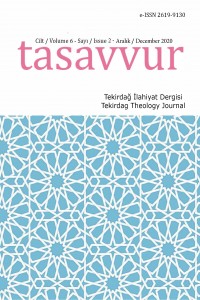Abstract
Tanrı’nın varlığına dair getirilen argümanlar, başarılı kabul edildiği taktirde en az bir tanrının var olduğu gösterir. Acaba kanıtların gösterdiği özelliklere sahip başka tanrılar da var mıdır? Bu sorun, Tanrı’nın tekliği problemi olarak bilinir ve özellikle orta çağ felsefesinde detaylı olarak tartışılmıştır. İslam kelamcılarının bu bağlamda Tanrı’nın tekliğini göstermek için verdikleri en önemli argümanlardan biri de “burhân-ı temânü”dür. Burhân-ı temânünün modal versiyonuna göre, her mümkün duruma gücü yeten (kâdir-i mutlak, omnipotent) ve iradesinde özgür (fâil-i muhtar) iki tanrının iradeleri mümkün bir durumda çelişkiye yol açar. Dolayısıyla bu özelliklere sahip iki tanrı varsaymak problemlidir. Bu makale, bahsi geçen argümanın başarılı olduğunu kabul ederek, her mümkün duruma gücü yeten ama iradeleri zorunlu olarak aynı iki tanrının mümkün olup olmadığını tartışıyor. Bu alternatifin söz konusu olabileceği senaryoları ele alarak her bir senaryonun problemli sonuçlara yol açtığını savunuyor. Bu çerçevede kelamda “burhân-ı tevârüd” adıyla bilinen argüman da güncellenerek ele alınan tartışmaya nasıl katkıda bulunabileceğini gösteriliyor.
References
- El-Bâcûrî, İbrâhîm b. Muhammed b. Ahmed. Tuhfeh el-Murîd fî Şerh Cevhere’l-Tawhîd. Nşr. Ahmed el-Echûrî. 1. Baskı. Beyrut: Dâru’l-Kutub el-İlmiyye, 1983.
- Bilmen, Ömer Nasuhi. Muvazzah İlm-i Kelam: Ehl-i Sünnet İtikadı. İstanbul: Ravza Yayınları, 2013.
- Gül, Ekrem Sefa. “Burhân-ı Temânuun Kesinliği Problemi” Tasavvur: Tekirdağ İlahiyat Dergisi 5/1 (2019), 377-416.
- İbn Sînâ, Kitâbu’ş-Şifâ: Metafizik (el-İlâhiyyât). Trc. Ekrem Demirli ve Ömer Türker. I-II. İstanbul: Litera Yayıncılık, 2005.
- Leibniz, G. W. Monadology and Other Philosophical Essays. İng. Trc. Paul Schrecker ve Anne Martin Schrecker. 8. Baskı. Indianapolis: The Bobbs-Merrill Comp., Inc., 1977.
- Muhtaroğlu, Nazif. “Tanrının Tekliğine Dair Modal Argüman”. Felsefe Arkivi, 51 (2019), 179-185.
- Şık, İsmail. “Burhân-ı Temânu’ya Eleştirel Bir Yaklaşım” Çukurova Üniversitesi İlahiyat Fakültesi Dergisi, 10/2 (2010), 17-43.
- Taftazânî, S. Kelâm İlmi ve İslâm Akâidi (Şerhu’l-Akâid). Trc. ve Haz. Süleyman Uludağ. 8. Baskı. İstanbul: Dergâh Yayınları, 2016.
- Teftâzânî, Sa‘düddîn. El-Makâsıd (Kelam İlminin Maksatları). Trc. İrfan Eyibil ve Eleştirmeli metin. Ahmet Kaylı. İstanbul: Türkiye Yazma Eserler Kurumu Başkanlığı Yayınları, 2019.
Abstract
Arguments for the existence of God, if assumed to be successful, show at most that there is at least one god. What if there are more gods that exemplify the attributes ascribed to God on the basis of these arguments? This is known as the problem of the uniqueness of God and had been discussed extensively in Medieval philosophy. Muslim mutakallimūn offered a famous modal argument for the uniqueness of God, which is known as burhān al-tamānu. According to this argument, the postulation of two omnipotent gods that have free will leads to a contradiction in a possible world. Thus, by a reductio argument this postulation is shown to be problematic. In this article, I assume that burhān al-tamānu is successful and consider the case as to whether two gods can have necessarily the same will. After I examine all the scenarios in which this assumption is held to be true, I show that all scenarios lead to problems. In this regard, I make use of another argument formulated by the Muslim mutakallimūn, which is known as burhān al-tawārud. This argument aims to show that two gods having the same will over the same thing leads to problems. After updating this argument, I show its relevance to the discussion in question.
Keywords
Philosophy of Religion Muslim kalām the modal argument for the the uniqueness of God burhān al-tamānu burhān al-tawārud
References
- El-Bâcûrî, İbrâhîm b. Muhammed b. Ahmed. Tuhfeh el-Murîd fî Şerh Cevhere’l-Tawhîd. Nşr. Ahmed el-Echûrî. 1. Baskı. Beyrut: Dâru’l-Kutub el-İlmiyye, 1983.
- Bilmen, Ömer Nasuhi. Muvazzah İlm-i Kelam: Ehl-i Sünnet İtikadı. İstanbul: Ravza Yayınları, 2013.
- Gül, Ekrem Sefa. “Burhân-ı Temânuun Kesinliği Problemi” Tasavvur: Tekirdağ İlahiyat Dergisi 5/1 (2019), 377-416.
- İbn Sînâ, Kitâbu’ş-Şifâ: Metafizik (el-İlâhiyyât). Trc. Ekrem Demirli ve Ömer Türker. I-II. İstanbul: Litera Yayıncılık, 2005.
- Leibniz, G. W. Monadology and Other Philosophical Essays. İng. Trc. Paul Schrecker ve Anne Martin Schrecker. 8. Baskı. Indianapolis: The Bobbs-Merrill Comp., Inc., 1977.
- Muhtaroğlu, Nazif. “Tanrının Tekliğine Dair Modal Argüman”. Felsefe Arkivi, 51 (2019), 179-185.
- Şık, İsmail. “Burhân-ı Temânu’ya Eleştirel Bir Yaklaşım” Çukurova Üniversitesi İlahiyat Fakültesi Dergisi, 10/2 (2010), 17-43.
- Taftazânî, S. Kelâm İlmi ve İslâm Akâidi (Şerhu’l-Akâid). Trc. ve Haz. Süleyman Uludağ. 8. Baskı. İstanbul: Dergâh Yayınları, 2016.
- Teftâzânî, Sa‘düddîn. El-Makâsıd (Kelam İlminin Maksatları). Trc. İrfan Eyibil ve Eleştirmeli metin. Ahmet Kaylı. İstanbul: Türkiye Yazma Eserler Kurumu Başkanlığı Yayınları, 2019.
Details
| Primary Language | Turkish |
|---|---|
| Subjects | Religious Studies |
| Journal Section | Articles |
| Authors | |
| Publication Date | December 31, 2020 |
| Submission Date | October 11, 2020 |
| Acceptance Date | November 17, 2020 |
| Published in Issue | Year 2020 Volume: 6 Issue: 2 |

